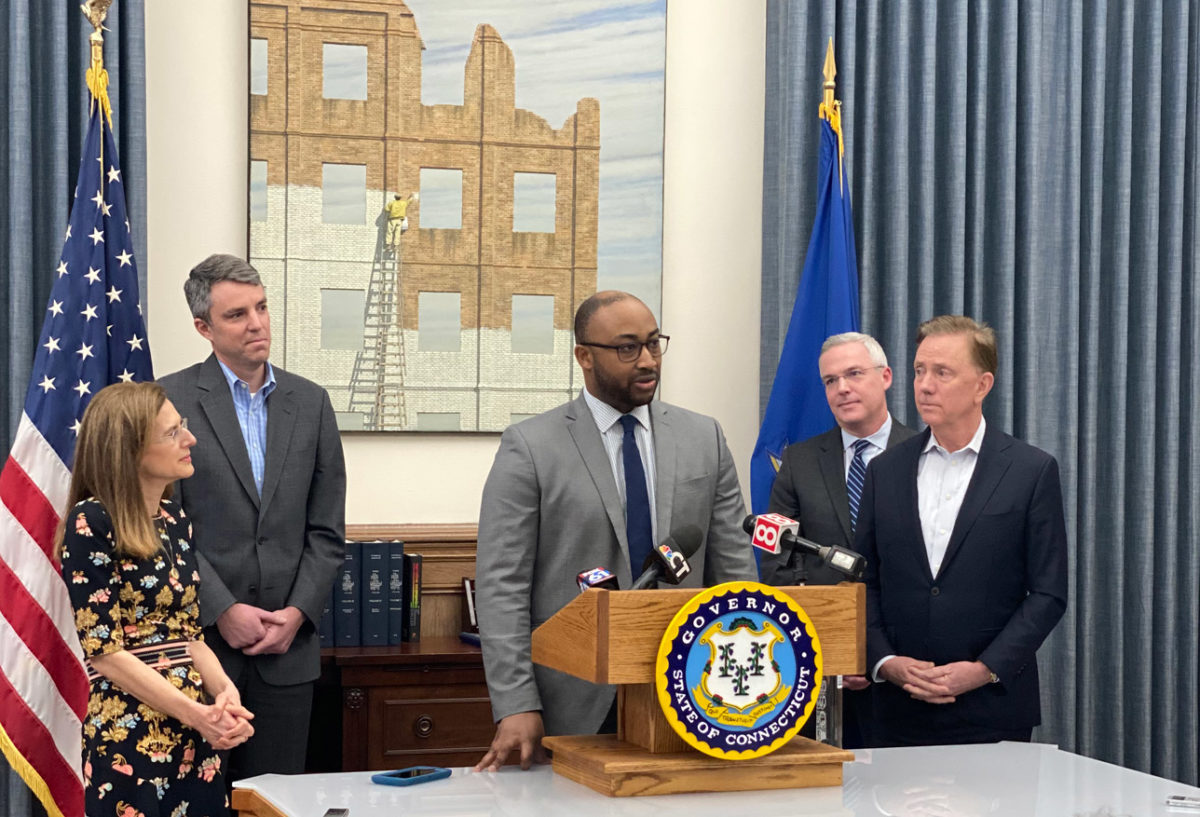Lamont’s chief of staff Paul Mounds looks ahead to post-Covid era as cases climb
Whether Connecticut is facing a “new normal,” or simply “the next normal,” was a recurring theme at a recent webinar featuring Gov. Ned Lamont”™s chief of staff, Paul Mounds Jr.
Hosted by, and featuring several members of, the Bridgeport law firm Pullman & Comley, the presentation was part of its ongoing “Responding to Covid-19” webinar series.

Mounds noted that his first day as chief of staff ”“ he previously was the state”™s COO, a position now held by Josh Geballe ”“ was Feb. 28; Connecticut”™s first Covid case was recorded on March 6, which he said effectively meant that the so-called “new normal” has practically become a way of life for him.
Lauding the Lamont administration”™s “gradual reopening” strategy, which had culminated in Phase 3 on Oct. 8, only to be scaled back to Phase 2.1 a few weeks later after the number of Covid cases began to rise again (and continue to do so), Mounds underscored that Connecticut could return to Phase 1 if the situation continues to deteriorate.
On Nov. 30, Lamont said he was not planning on reinstituting restrictions on businesses, although a group of doctors have formally requested he close gyms and put a pause on indoor dining due to the current spike.
As of that date, the state had topped 5,000 Covid-related deaths ”“ 5,020, to be exact ”“ with hospitalizations continuing to increase, to 1,098, its highest total since the middle of May. The state”™s positivity rate stood at about 4.1%, an improvement from the 6%-plus it was at a few weeks ago but still a far cry from the 1% or lower threshold that was recorded over most of the summer.
On Nov. 24, a group of 42 doctors and one nurse sent a letter to the governor stating: “Even though it is still early in the second wave, we are already spilling outside our ICUs, calling for extra volunteers, and we are exhausting the supply of advance-practice nurses and medical residents who help us provide the best possible care.”
“At the current pace,” it continued, “we will soon fill up all our hospital floor beds within 7-14 days and be forced to move into our post-anesthesia care units and operating rooms, which will require our surgical colleagues to stop elective operations. Operating rooms weren”™t designed to care for ICU patients anyway, as their design impairs line of sight communication and monitoring and other strategies that leverage teamwork to achieve the best outcomes.”
Although Lamont has said he continues to speak with health care officials and practitioners around the state, he indicated on Nov. 30 that the situation may be serious, but is not dire. Seventy-one percent of the state”™s approximately 8,000 hospital beds are now occupied, according to Geballe, with 33% of 1,000 ICU beds now taken by Covid patients. Another 26% of ICU beds are occupied by non-Covid patients, according to Geballe.
Masks not going away anytime soon
Meanwhile, as headlines about the arrival of a Covid vaccine”™s arrival continue to proliferate, Mounds said at the webinar that residents should “get comfortable wearing a mask, first and foremost. I don”™t know that mask-wearing guidelines will go away anytime soon.”
Large gatherings are also unlikely to return to pre-Covid levels anytime soon, he said.
As for businesses, Mounds said that some 99% of them are now open, with the obvious exceptions of bars and nightclubs, which have not been allowed to operate since the pandemic began. There is, however, a lag between being open and realizing pre-Covid levels of activity and income, he said, putting those figures at about 80%.
He further predicted that changes to the state”™s Property Transfer Act, which will require property owners to clean up toxic spills and other forms of pollution ”“ and reportedly could create as many 27,000 jobs ”“ will ultimately create job hubs around the state, once such work can begin in the post-Covid era.
While touting the residential real estate boom that Connecticut has enjoyed as New Yorkers stream to the state, Mounds noted that Department of Economic & Community Development Commissioner David Lehman and his team are “not shy about highlighting the great benefits of Connecticut as a whole, not just in the Fairfield County area. People are thinking differently about the state, not just from a professional standpoint but from a family values and family health standpoint as well.”
Mounds said he was “very confident that we”™ll have some really beneficial announcements” about companies relocating here “in the near future.”
Pullman attorney Nancy Hancock then took a look at what she called “the next normal” for Connecticut”™s businesses, which she said have “learned to do more with less” during the pandemic ”“ something she said could continue even after Covid has passed.
Growth in telemedicine and telehealth, fintech, remote learning at colleges, and work-from-home trends, while already in evidence before the coronavirus hit, have accelerated during the crisis. “Banking may be changed forever,” she said. “There are people now who may never go back to the office.”
The latter in particular could have a long-lasting effect on the retail and restaurant sectors, she said, as such employees tend not to buy work-appropriate clothing or eat out as much as those reporting to the office.
Continued “creative reinvention” may be necessary at schools and entertainment venues, Hancock said. “Which changes will be permanent and which will be temporary as we find a vaccine and get out of this Covid mess?” Hancock wondered.
How lawyers draw up contracts will also be affected, she said, as “a pandemic and government shutdown were not in people”™s thoughts” before. Similarly, lenders will change the way they conduct risk analyses, she predicted.